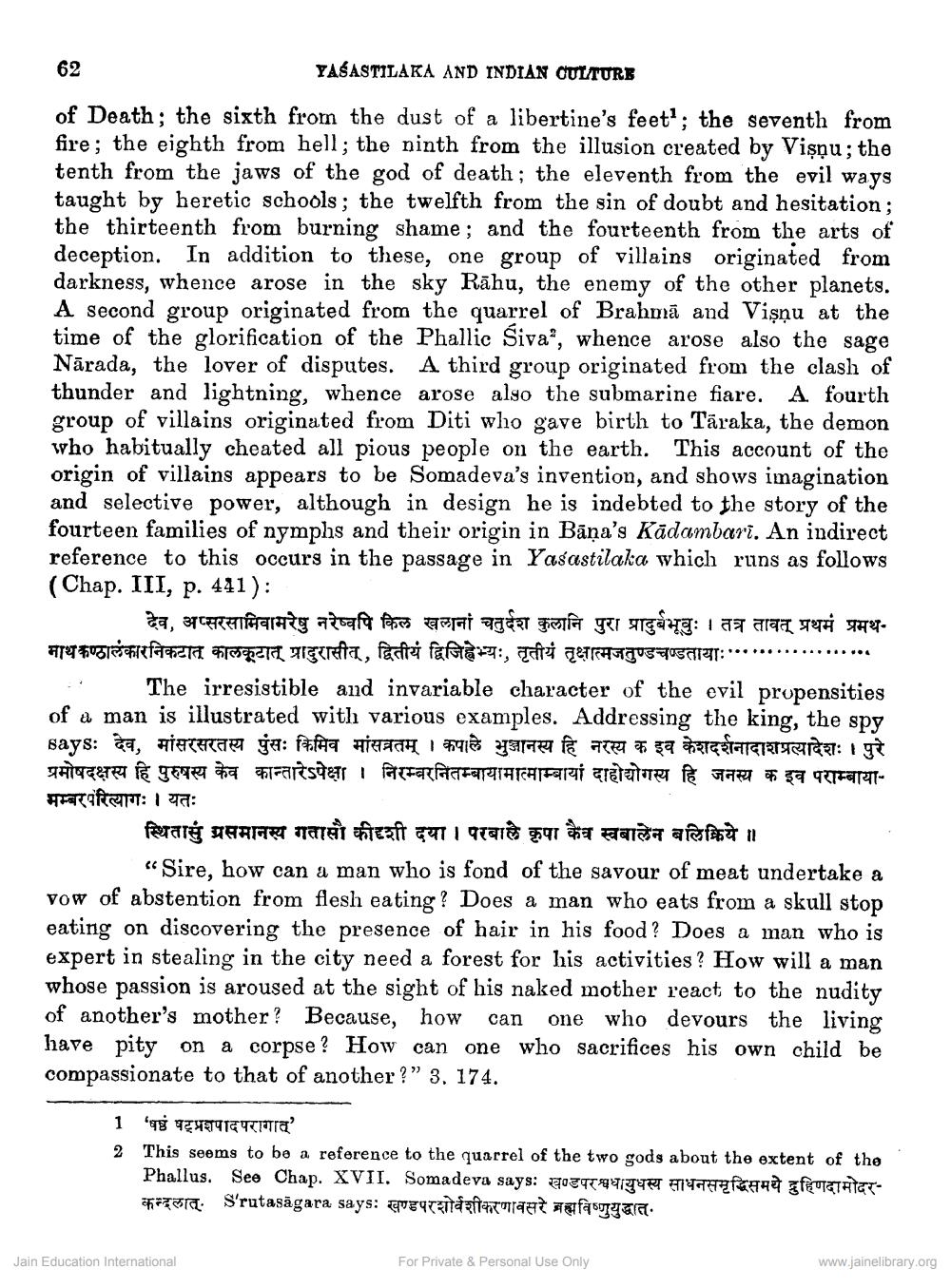________________
YASASTILAKA AND INDIAN CULTURE
of Death; the sixth from the dust of a libertine's feet; the seventh from fire; the eighth from hell; the ninth from the illusion created by Vişņu; the tenth from the jaws of the god of death; the eleventh from the evil ways taught by heretic schools; the twelfth from the sin of doubt and hesitation; the thirteenth from burning shame; and the fourteenth from the arts of deception. In addition to these, one group of villains originated from darkness, whence arose in the sky Rāhu, the enemy of the other planets. A second group originated from the quarrel of Brahma and Vişņu at the time of the glorification of the Phallic Siva', whence arose also the sage Nārada, the lover of disputes. A third group originated from the clash of thunder and lightning, whence arose also the submarine fiare. A fourth group of villains originated from Diti who gave birth to Tāraka, the demon who habitually cheated all pious people on the earth. This account of the origin of villains appears to be Somadeva's invention, and shows imagination and selective power, although in design he is indebted to the story of the fourteen families of nymphs and their origin in Bāna's Kādambari. An indirect reference to this occurs in the passage in Yasastilaka which runs as follows ( Chap. III, p. 441):
देव, अप्सरसामिवामरेषु नरेष्वपि किल खलानां चतुर्दश कुलानि पुरा प्रादुर्बभूवुः । तत्र तावत् प्रथमं प्रमथमाथकण्ठालंकारनिकटात् कालकूटात् प्रादुरासीत् , द्वितीयं द्विजिह्वेभ्यः, तृतीयं तृक्षात्मजतुण्डचण्डतायाः...
2. The irresistible and invariable character of the evil propensities of a man is illustrated with various examples. Addressing the king, the spy says: देव, मांसरसरतस्य पुंसः किमिव मांसव्रतम् । कपाले भुञानस्य हि नरस्य क इव केशदर्शनादाशप्रत्यादेशः । पुरे प्रमोषदक्षस्य हि पुरुषस्य केव कान्तारेऽपेक्षा । निरम्बरनितम्बायामात्माम्बायां दाहोद्योगस्य हि जनस्य क इव पराम्बायामम्बरपरित्यागः । यतः
स्थितासु ग्रसमानस्य गतासौ कीदृशी दया । परबाले कृपा कैव स्वबालेन बलिक्रिये ॥
“Sire, how can a man who is fond of the savour of meat undertake a vow of abstention from flesh eating? Does a man who eats from a skull stop eating on discovering the presence of hair in his food? Does a man who is expert in stealing in the city need a forest for his activities? How will a man whose passion is aroused at the sight of his naked mother react to the nudity of another's mother? Because, how can one who devours the living have pity on a corpse? How can one who sacrifices his own child be compassionate to that of another?" 3. 174.
1 2
g 97499TETITIE This seems to be a reference to the quarrel of the two gods about the extent of the Phallus. See Chap. XVII. Somadeva says: DOSTUURT fare for za Srutasāgara says: queqrantzitaiat fasuyga.
Jain Education International
For Private & Personal Use Only
www.jainelibrary.org




